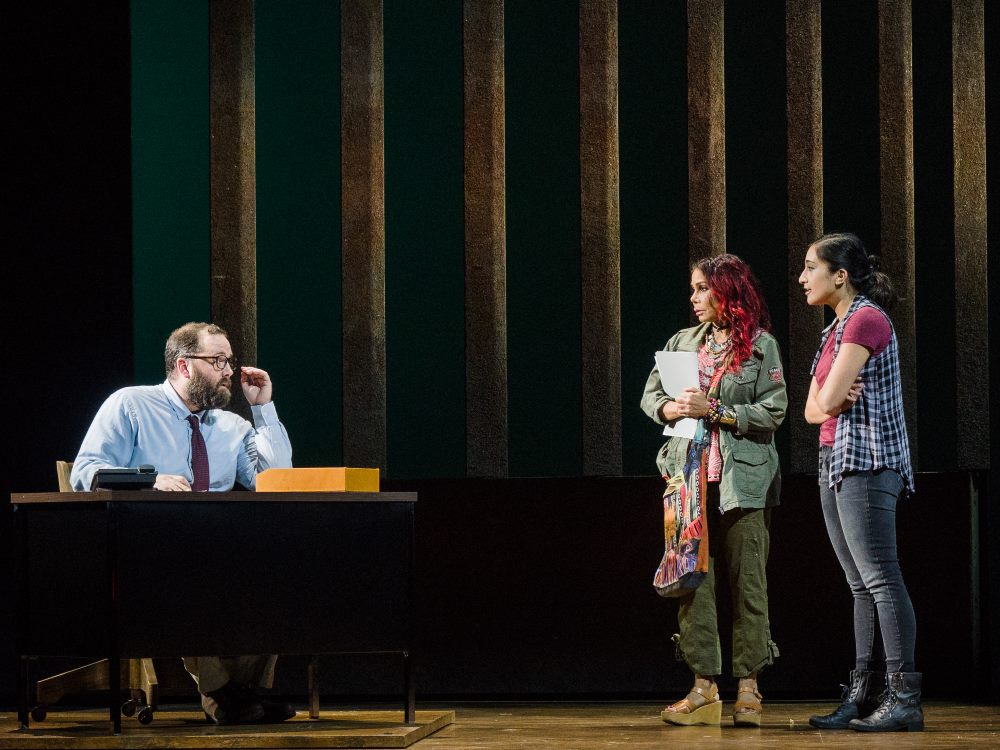On Nov. 7, 2016, American Theatre ran a story about Miss You Like Hell, a new musical by Quiara Alegría Hudes and Erin McKeown, that was playing at La Jolla Playhouse in California. The next day, Donald J. Trump was elected President of the United States. As part of our ongoing coverage on how artists are responding to the results of 2016 election, we decided to revisit this musical and its themes of immigration, family, and modern Americana. We did some additional reporting, and made it the cover story of our January 2017 issue.
For most artists, the harshest critic in their life isn’t The New York Times, it’s themselves. Case in point: Pulitzer-winning playwright Quiara Alegría Hudes. “No one scrutinizes the work more than I do,” she said over Skype from La Jolla, Calif., last October, as she was readying her newest project, a musical called Miss You Like Hell. It wasn’t just based on her 2009 play 26 Miles; it emerged from her dissatisfaction with the original.
“It was one that I felt never lived up to its full potential,” she explained. “But the idea itself I thought had greater potential, so it was hard for me to let it go.”
It wasn’t that the play hadn’t been successful—it had well-received productions across the country, and was published in American Theatre’s July/Aug. ’09 issue—or that Hudes needed to recycle material. Her most recent play, Daphne’s Dive, received a much-lauded run at Signature Theatre in New York City last year, following the national success of her “Elliot Trilogy,” which won her the 2012 Drama Pulitzer for its middle installment, Water by the Spoonful.
But she felt more than a vague discontent with 26 Miles; in recent years, Hudes had gone so far as to pull rights on a few productions because of her unhappiness with the play. While she felt the story—of an estranged mother and daughter on a road trip across the U.S. to repair their relationship—had merit, she felt she “never captured the scale of the America I wanted to capture, I never captured the mother and daughter the way I wanted to capture them.” Hudes had a personal connection to the work: It was inspired by a road trip she took with her own mother to the Rosebud Indian Reservation in South Dakota.
At the center of Miss You Like Hell is the mending of the relationship between a mother, Beatriz, and her daughter, Olivia. The original play, though, was too vague on the details, Hudes felt: “Where are this estranged mother and daughter going and why? What is the ticking clock of their road trip? Also, why are they estranged?”
In updating the original play, which was set in 1986, to the present day, she found a through-line that felt truer—and more timely. Olivia is still the daughter of a white father and a Latina mother (now Mexican, changed from Cuban), but this time there’s a new wrinkle. “They were separated because the mother was not a citizen, and that got her into trouble when there was a custody case,” explained Hudes. “That was a reason for them to be estranged, and it’s also a reason for them to get back together, which is that the mom is facing her final [immigration] hearing.”
This ratcheting up of the dramatic stakes would prove unfortunately prescient. Miss You Like Hell opened at La Jolla Playhouse on Nov. 6, just two nights before Donald J. Trump was somewhat unexpectedly elected president. And quite suddenly this mother/daughter drama took on a new layer of meaning in the incipient Trump era. Even before the election, Hudes was calling the piece “a theatrical fantasia on the state of the union.” Now, as La Jolla Playhouse artistic director Christopher Ashley put it, “What a gift to my theatre that this is the play we’re doing at the moment we turn this corner. I think it’s important, and I think it speaks in really humane ways to this issue.”

To create the musical, Hudes teamed with singer/songwriter Erin McKeown, director Lear deBessonet, and actor Daphne Rubin-Vega. The material resonated strongly with both McKeown and Rubin-Vega, in different ways. For McKeown, it was the story’s road trip, from Philadelphia to Los Angeles, with many stops along the way, that she related to most closely. “It definitely meshes really well with my life,” said McKeown over the phone after a rehearsal. “It’s one of the great pleasures of my singer/songwriter career, honestly—to get to know America in that very intimate, town-to-town way.” Similarly, her score for Miss You Like Hell incorporates musical idioms from different regions in the U.S., including blues, rock ’n’ roll, and choral singing.
But for Rubin-Vega, the immigration storyline struck chords with her own family’s story. The performer came to the United States from Panama at the age of 2 with her mother, Daphine, who died when Rubin-Vega was 10. In playing Beatriz, she drew on memories of her mother, and in researching the role she found herself looking through her family’s immigration papers.
“It makes me just look and see the sacrifices that every immigrant makes,” Rubin-Vega said over the phone before a rehearsal. “I think about the personal price that my mother made coming to this country, and getting married, falling in love with someone who actually adopted her children, and the tragedy of her dying right after that.”
Miss You Like Hell marks 10 years since Rubin-Vega was last in a musical; her most recent foray into that realm was as Fantine in Les Misérables on Broadway. She’s been acting in plays since, most notably as Stella in the 2012 Broadway revival of A Streetcar Named Desire. She says she’s been waiting for a musical to speak to her in such an intensely personal and culturally specific way. Unlike Stella and Fantine and other nontraditional roles, Miss You Like Hell allows Rubin-Vega to play something that is still rare onstage: a powerful, multifaceted Latina lead character.
“It’s a huge honor to play a role where I actually look like the person,” said Rubin-Vega, who first broke through as Rent’s original Mimi. “A lot of us spend our whole life trying to adapt, to put ourselves into something and to be told that it’s not quite it. So we create roles for us, and that’s what we’re doing here. And it’s not just for us, it’s for the world, but we’re telling the story.”

Miss You Like Hell was written as the Obama presidency unfolded, with many elements needing adjustments along the way. For example, an early draft had an older gay male couple traveling from Arkansas to Iowa because they couldn’t marry in Little Rock. “Then all of a sudden one day,” Hudes recalled, “Erin and I had a phone call and it’s like, ‘They can get married wherever they want now, so why on Earth are they on a road trip in the Midwest?’” This development led to a new idea: The same couple is now on a quixotic road trip to visit all 50 states and get married in each one.
Though Hudes and McKeown were also on the lookout for new developments on immigration, they weren’t prepared for the biggest twist in that story. Trump, a man who promised and seems ready to build a wall on the Mexican border and deport millions of undocumented immigrants, became the president-elect—the show now inevitably means something different. There’s little sense of hope or change ahead. After all, even under President Obama, a record 2.5 million undocumented immigrants were deported.
Catching up with Hudes a week after the election, after she’d returned to her home in New York City, she was downcast, and she reported a similar mood among the actors, particularly Krystina Alabado, who plays Olivia. “Krystina as a young woman was very, very bereft,” Hudes said, sipping bourbon in the bar at the Public Theater, “and I think that Daphne, as someone who has seen more leaders, good and bad, was also very devastated, but with a bit more perspective.”
In the musical, the elder Beatriz is facing deportation due to a decades-old misdemeanor (smoking pot in a public park), even though she’s paid taxes and followed the law ever since. Hudes added that “criminal” undocumented immigrants—ones that President-elect Trump has said he wants to target—might be those with infractions as small as being pulled over for a busted tail light. “The political talk about, ‘We’re only deporting criminals’—it’s alienating and it’s not informative,” said Hudes. “It doesn’t reflect the panoply of complicated human lives that it interacts with.”
Miss You Like Hell ends—Hudes does not mind giving it away—with Beatriz deported. The final moment has her and Olivia standing on opposite sides of the Mexican border wall, their fingers touching. While the ending was bittersweet before, said Hudes, “I think it went from a show that felt like a drama with a lot of humor to an overnight tragedy.” More importantly, it puts a personal face to the news headlines, showing that deportations tear families apart and “kids go parentless and are orphaned,” she said.
Hudes admitted that post-election she was avoiding the 24-hour news cycle and turned instead to literature and poetry: James Baldwin, Nietzsche, Mary Oliver. “I don’t know what work I can do right now that will help Donald Trump govern this nation, that will help get him to listen,” she said. “So I feel like my role as an artist is kind of pushed up and my role as a citizen feels a little more futile, to be honest.”
So what can artists do? Tell stories, said Hudes: “Art has a lot of stories that must be told right now about our humanity, the truth of our culture, the meaning of life and the human soul—and that can be white, that can be black, that can be mixed, that can be Latino, but it’s about being human.”
Of course, that was what Miss You Like Hell was about before the election, and still is. Before the final interview, Hudes was revising the book for an imminent Off-Broadway production—though what she really hopes for is a future where the work will no longer be so politically relevant. “I think it’s a story that needs to get heard,” she said ruefully, “but I hope that it’s a story that becomes outdated.”


